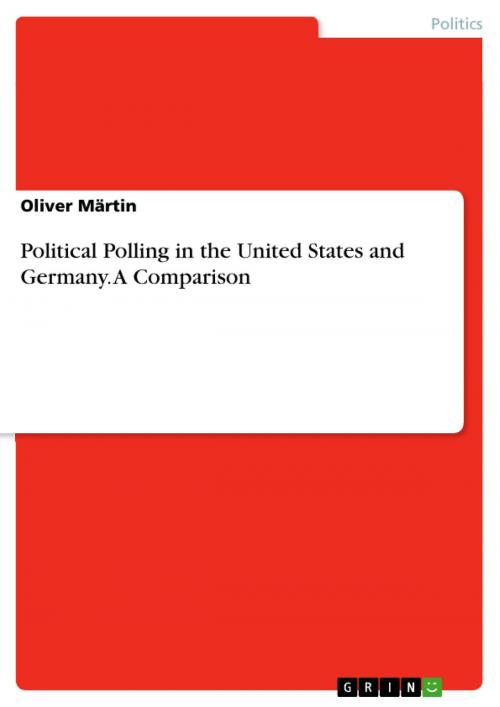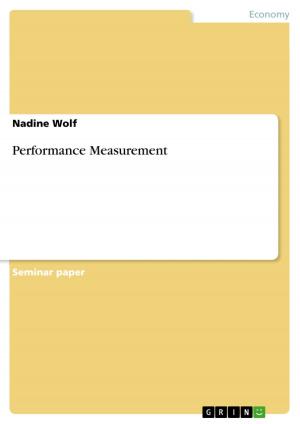Political Polling in the United States and Germany. A Comparison
Nonfiction, Social & Cultural Studies, Political Science, International, Foreign Legal Systems| Author: | Oliver Märtin | ISBN: | 9783668073289 |
| Publisher: | GRIN Publishing | Publication: | October 23, 2015 |
| Imprint: | GRIN Publishing | Language: | English |
| Author: | Oliver Märtin |
| ISBN: | 9783668073289 |
| Publisher: | GRIN Publishing |
| Publication: | October 23, 2015 |
| Imprint: | GRIN Publishing |
| Language: | English |
Document from the year 2013 in the subject Politics - Political Systems - General and Comparisons, grade: 1,7, Free University of Berlin (Otto Suhr Institut), course: Introduction to Comperative Politics, language: English, abstract: In western postmodern political life polling is a pivotal instrument in the political arena. Polling is a vital instrument for analyzing name recognition of political auteurs, for preparing campaign strategies, for screening public opinion, for generating job approval ratings or simply forecast elections respectively waging potential election prospects for political combatants, who considering running for a higher public office. Moreover polling results playing not only a decisive role in U.S. primaries, indeed they actually are finally the decision makers, which political candidate may enter a television debate (so in the GOP primary of 2012 ) to campaign for his or her political cause. Even in the aftermath of political election polling is used not only to judge the pollster, but to judge the political combats, who successful they played the political expectation game. Indeed polls to forecast election differ in Germany and the United States. In that context can be mentioned aspects such as likely voters, Minority Turnout and other aspects that are not common vocabulary of German political pundits. Meanwhile in Germany public polls often can forecast elections prospects quite clear. A big contrast can be stated in the United States regarding the 2014 midterm election. Several polls show democrats leading the 'generic ballot' for Congress, without indicating a sure democratic takeover of the house. An Article in the Washington post asked 'How many votes do democrats need to retake the house?'
Document from the year 2013 in the subject Politics - Political Systems - General and Comparisons, grade: 1,7, Free University of Berlin (Otto Suhr Institut), course: Introduction to Comperative Politics, language: English, abstract: In western postmodern political life polling is a pivotal instrument in the political arena. Polling is a vital instrument for analyzing name recognition of political auteurs, for preparing campaign strategies, for screening public opinion, for generating job approval ratings or simply forecast elections respectively waging potential election prospects for political combatants, who considering running for a higher public office. Moreover polling results playing not only a decisive role in U.S. primaries, indeed they actually are finally the decision makers, which political candidate may enter a television debate (so in the GOP primary of 2012 ) to campaign for his or her political cause. Even in the aftermath of political election polling is used not only to judge the pollster, but to judge the political combats, who successful they played the political expectation game. Indeed polls to forecast election differ in Germany and the United States. In that context can be mentioned aspects such as likely voters, Minority Turnout and other aspects that are not common vocabulary of German political pundits. Meanwhile in Germany public polls often can forecast elections prospects quite clear. A big contrast can be stated in the United States regarding the 2014 midterm election. Several polls show democrats leading the 'generic ballot' for Congress, without indicating a sure democratic takeover of the house. An Article in the Washington post asked 'How many votes do democrats need to retake the house?'















